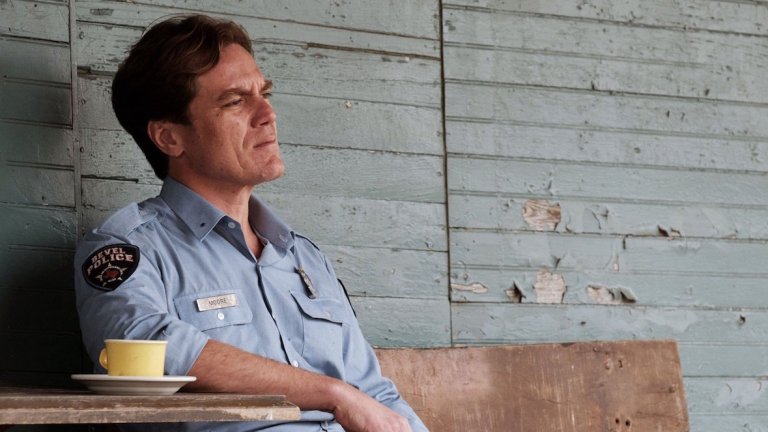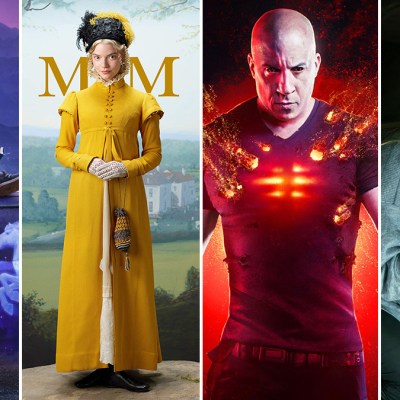Michael Shannon on New Film Losing SXSW Debut Amid COVID-19, Industry’s Future
Michael Shannon opens up about his feelings for The Quarry premiering on VOD after losing its festival premieres. Plus his hope that "we wouldn’t be looking at just a bunch of superhero movies" after this is over.

It’s fair to say that our new reality caused by the coronavirus pandemic has upended everything we took for granted. Concerts and comic-cons are gone, movie theaters are closed, and for that matter movie festivals like SXSW are cancelled too. Yet in that void, plenty of original films that were supposed to open in theaters or at festivals, such as Scott Teems’ The Quarry, are finding their way to VOD. Previously scheduled for a SXSW premiere, The Quarry just debuted on VOD, bringing an original idea and major talent like Michael Shannon and Shea Whigham to your living room.
Based on the book from author Damon Glagut, The Quarry follows the story of an unnamed man (Whigham), as he searches to leave his troubled past behind and start anew as a preacher in a small Texas bordertown. However, the circumstances of how he made his way to this town are shrouded in mystery, and Police Chief Moore (Shannon), is all but a bit wary of the newcomer and what his presence means.
We had the chance to talk with Michael Shannon about the film, his role as a producer, and get his thoughts on what we can expect to see from the world of the arts once we endure the lockdown new normal.
Chief Moore is painted for the audience to be somewhat bigoted, but do you think he conciousley sees himself that way?
Well, I think he’s a product of his environment. He was raised a certain way by certain people in a certain place. Unfortunately, the lion’s share of people aren’t very self-reflective about that. They just roll with it. It’s like, “This is me. This is where I come from. This is what I believe,” and it’s a shame. If it was mandatory, if everybody had to take inventory of these things and reflect on them, and be critical of them, the world would be a better place. Of course most people aren’t or don’t.
While he may not be reflective in that sense, he does seem to be very aware of when he does cross certain lines. He’s always apologizing.
Yeah, I think subconsciously he carries a certain form of guilt and that is what kind of endeared me to him. The first time I read the script, I said to myself, “Is this guy just a prick?” Then I realized the more I thought about it, he was a little more complicated than that. I think he wants to be a good person and I think by the end of the film he’s been jossled into a place where that might be a possibility, but it took some work to get there.
He also seems to be a straight shooter when it comes to his job.
I don’t think I would call him the world’s most extraordinary law enforcement officer, but he wants to have a nice little town and he doesn’t want his people getting hurt or doing stupid stuff. And to the best of his ability, he tries to make that a reality.
I keep thinking about the scene of you sitting in that boot, taking shots at some cans, but you keep missing that one last target. Did you tie that specifically into his focus on the specific events surrounding the film, or was it more a metaphorical comment on Chief Moore’s worldviews?
It’s funny you bring up that moment… I like to keep that open for interpretation, and I like both the interpretations you came up with. The way I understood it from Scott is that this is the manifestation of his hunch that something is up, and he can’t quite put his finger on it. He knows something is wrong, something doesn’t make sense, and it’s bugging him. I think it is a beautiful moment and I love moments like that to stay open to interpretation.
Even when Moore gets a good idea something is wrong, do you think he would be willing to just have let things go on if he couldn’t prove anything?
That’s a tough question to answer with certainty. I think in a way he’s kind of left up in the air on purpose. It let’s people think for themselves on what they would think the reality would be. The other day, I was discussing an entirely different movie with some investors, something we might make in the future, and they said, “What do you want people to think at the end of the movie?” I said, “I want them to think about themselves.” Who cares what the character is going to do, what are you gonna do? The characters, they’re imaginary, but you’re freaking real. So you take this story in, and what does it make you feel? What does it make you think? Does it have any effect on your behavior? That’s what I’m interested in.
And that is what I want out of a film too. Even if there are finite answers, if I can come up with something that changes me, I’m all for it. But for your own performance, do you have to bring in your own thoughts and ideas to solidify what you want to have come across?
I think he knows he fucked up. I think he knows that. I don’t think he can any longer convince himself that the Man [Whigham’s character] is who he thought he was.
Thinking about the Man, most people would point to Boardwalk Empire in terms of you and Shea working together, but you two have shared screen time on a lot of different projects.
Yeah, I love Shea. He’s like a brother to me, and I love this part for him. I thought it was an amazing opportunity for him. Honestly, like I said, I wasn’t totally sold on playing Chief Moore after the first read. When I heard Shea was playing the Man, I instantly said I have to do this.
So this wasn’t the case of you acting as a producer on the film suggesting that Shea be brought in?
Yeah, Shea wasn’t necessarily my idea, but when I heard he was doing it, I was ecstatic.
Of course this is based on a book that is 25 or so years old. Did you go back and look at any of the source material?
I did read the book, yes. I read the book, and in the book, the Chief is very tight-lipped. He didn’t say much of anything. It was nice that Scott gave him a bit more personality. That definitely made it more fun to do. It’s interesting to notice the similarities and the differences. The book is set in South Africa and they have their own issues down there with prejudice and classism, but it definitely has a different flavor to it, being set here in the South.
What does having your name attached as a producer mean for you? In ways, it is a bit of an extra stamp of approval from you about your faith in the project?
You know, it could be really simple things. There are those producers that do tons and tons of paperwork , and make sure all the finances are in order; you know, that actual hard stuff. Then there are those producers that are there to say, “I think we should shoot this in Florida…” It can be anything. For me, it’s just another step in the evolution of my career.
Now I get to claim some sort of ownership of this, which honestly I think is more just a feather in the cap of the people I work with; my agents and my managers. It’s like when I did My Son, My Son, What Have You Done?, I would watch people ask Werner Herzog, “What was it like to have David Lynch produce your movie?” And Wenrer would come back, “David Lynch had absolutely nothing to do with this movie.” It was true, his name was on the poster and it was like, “Okay, that’s cool.” It’s funny how wide a spectrum there is in terms of “producers.”
But, just like Lynch’s name on the poster, whether or not people know what role you played in the production, seeing your name as a producer might attract people to visit the movie even more.
I hope so. I feel that way about this movie. I want as many people as humanly possible to see it. Now that might sound like a ridiculously obvious thing to say, but you know, you make some movies where you feel, “Eh, maybe some people will see it, maybe some won’t… who cares.” But this one, I think is very relevant and I’m a little sad that people won’t be able to see it on the big screen; it’s shot so beautifully.
It is completely understandable to want everyone to see any film on a big screen, but as the film was about to make its festival rounds, specifically at SXSW, do you think there is a draw for even more people to see it, having this odd distinction of a film that has been affected by the COVID-19 outbreak?
I’m all for holding out hope. I think you hope that this whole event makes people realize how important culture is, and how important the arts are. The arts are really being threatened right now by this, particularly theater, which I love.
I have moments where I think, “Jesus, I don’t know if we’re going to be able to get people to go back into a theater again.” Even if they open them back up, aren’t people going to be terrified? It’s a significant absence I think, and it’s going to be felt. Particularly people who need that right now for their mental [health]. They need that culture.
Once we get through all of this, do you think we are going to see even more pieces of art centered around complete escapism? Or do you think there will be just the same amount of reflective works coming out of this?
I don’t know. I’ve been talking to people, and they say, “Thank God you’re an artist. You can write a song, do this or do that,” but it’s hard to feel inspired right now. I’m dealing with a lot of anger. I’m very angry about what’s happened, and I’m very angry about the way it has been handled.
I’m not sure about anger… You know, Miles Davis used to say he was so angry, and that’s what made him such a good trumpet player. By and large, I don’t think anger is a great source for material, so I don’t know. I think there’s going to be a lot of contemplation, certainly we’re going to have a lot of time to contemplate. I would hope that after this we wouldn’t be looking at just a bunch of superhero movies. You would hope we have something a little more significant to say. I know a lot of people that are in The Avengers; I love them all to pieces… but I don’t want to see The Avengers: COVID-19.


